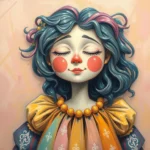
Have you ever woken up from a dream and felt that familiar tug at your heart, as if there was something more to it than just a series of images? Our dreams often serve as a window into our subconscious, revealing hidden fears, desires, and emotions that we might not be aware of during our waking hours. They can be puzzling, enlightening, and even profoundly transformative. Understanding these nightly narratives can help us navigate the complexities of our daily lives and lead us toward personal growth and clarity.
In this exploration, we will delve into the symbolism behind our everyday dreams, analyze the experiences that shape these dreams, and ultimately uncover insights that can foster personal development. Whether you dream of a mundane task or an extraordinary adventure, every dream contains a message waiting to be decoded. So, let’s embark on this journey together!
The Fabric of Dreams: Weaving Symbolism into Daily Life
When we think about dreams, we often consider the symbols that populate them. From the mundane to the bizarre, every element in our dreams can carry significant meaning. For instance, dreaming about losing your keys might reflect feelings of being unprepared or lost in your waking life. In many cultures, keys symbolize access and control; thus, losing them can indicate a fear of losing control over some aspect of your life.
Colors, too, play a vital role in dream symbolism. A bright red can signify passion or anger, while blue may evoke calmness or sadness. The setting of your dream is also crucial. A crowded marketplace might represent a sense of overwhelm or choice, while a serene forest could symbolize a longing for peace and solitude.
Consider the dream of climbing a mountain. This can symbolize a desire for achievement or an aspiration you hope to reach. The effort it takes to climb may echo the challenges you face in your waking life. Conversely, a dream about falling often relates to feelings of insecurity or fear of failure. This duality in symbols highlights the importance of context; the same symbol can take on different meanings based on personal experiences and emotions.
Animals also feature prominently in dreams, often embodying instinctual behavior or representing facets of our personality. A snake, for example, can signify transformation or a hidden threat, depending on your feelings toward the creature in waking life. Meanwhile, dreaming of a bird might reflect a desire for freedom or a need to rise above your current circumstances.
As you reflect on your own dreams, pay attention to the specific symbols that appear. By identifying these elements, you can begin to understand how they resonate with your daily life, revealing insights into your inner world.
Walking the Dreamwalk: Scenarios from the Everyday
Dreams often reflect our daily experiences, encapsulating our emotions, fears, and aspirations. Here are some relatable scenarios that you might find familiar, along with insights into their meanings:
1. The Never-Ending Meeting
Imagine you dream of being stuck in a meeting that seems to go on forever, where no conclusions are reached, and you feel increasingly frustrated. This scenario might indicate feelings of being overwhelmed by responsibilities or a sense of futility in your current endeavors. Ask yourself, are there aspects of your life where you feel your voice isn’t being heard, or where you’re struggling to assert your needs?
2. The Forgotten Presentation
In this dream, you find yourself unprepared for an important presentation. You’re standing in front of an audience, and suddenly, you can’t remember your material. This could symbolize your fear of inadequacy or anxiety about being evaluated. It may reflect your waking life worries about performance or the pressure to succeed. Consider addressing these feelings head-on by preparing more thoroughly in your real life or practicing self-compassion.
3. Traffic Jam Blues
Picture yourself in a dream where you’re stuck in a traffic jam, surrounded by honking cars and frustrated drivers. This scenario often symbolizes feelings of stagnation or a lack of control over your life’s direction. It might be time to evaluate any obstacles you’re facing and explore ways to navigate around them. Are there changes you can make to regain a sense of movement and purpose?
4. The Lost Child
In this dream, you realize you’ve lost a child (whether it’s your own or a child you know) in a crowded place. This can evoke feelings of panic and anxiety. Symbolically, it may represent a sense of responsibility you feel for those around you or a fear of losing touch with something important in your life. Reflect on your relationships and responsibilities; are you feeling overwhelmed or disconnected from loved ones?
5. The Old School
You find yourself back in high school, wandering the hallways, accompanied by feelings of nostalgia and anxiety. This dream often connects us to our past, reflecting unresolved issues or the desire to reclaim lost aspects of ourselves. It may signify a fear of judgment or a feeling of inadequacy. Consider what lessons from that time still resonate with you and how they might be influencing your current life.
These scenarios encapsulate how our daily experiences can manifest in our dreams, acting as mirrors reflecting our innermost thoughts and feelings. By examining these dreams, we gain valuable insights into our waking lives.
Dreamscapes of Growth: Transforming Insights into Action
As we navigate the landscape of our dreams, we uncover profound opportunities for personal growth. Each dream carries the potential for transformation, encouraging us to confront our fears, embrace our aspirations, and ultimately thrive in our waking lives. Here are a few ways to harness the power of your dreams for personal development:
Embrace Your Emotions
Dreams often serve as a safe space for processing emotions. If a dream leaves you feeling unsettled, take time to explore those feelings. Journaling can be an effective tool here; write down your dream and your immediate feelings about it. This practice can foster self-awareness and help you identify patterns in your emotional responses.
Set Intentions
Before drifting off to sleep, consider setting intentions for your dreams. This might involve asking your subconscious to provide clarity on a specific issue or to help you address a fear. By doing so, you’re actively engaging with your inner self, opening the door for insights to emerge during your dream state.
Foster Self-Compassion
Dreams often highlight our insecurities and fears. As you analyze your dreams, practice self-compassion. Understand that experiencing anxiety or feeling lost is part of being human. Remind yourself that it’s okay to seek help or take a step back when needed.
Create a Dream Ritual
Establishing a ritual around your dream practice can enhance your connection to your subconscious. This might involve setting aside time each morning to reflect on your dreams, creating a dream journal, or engaging in meditation before sleep. Such practices can deepen your understanding of your dreams and their messages.
Seek Connection
Share your dream experiences with trusted friends or a community interested in dream analysis. Discussing your dreams can provide fresh perspectives and insights you might not have considered. Sometimes, others can help illuminate connections between your dreams and your waking life that you may have overlooked.
By incorporating these practices, you can turn the insights gleaned from your dreams into actionable steps for personal growth and transformation.
Reflecting on our dreams can be a powerful tool for uncovering the deeper meanings behind our daily experiences. As we become more attuned to our subconscious, we tap into a wealth of knowledge that can guide us through the complexities of life. Embrace your dreams as a source of wisdom, for they hold the keys to unlocking your true potential.
In the words of Carl Jung, “Your vision will become clear only when you can look into your own heart.” As you embark on your journey of dream exploration, remember that the answers you seek are often waiting patiently within you, ready to be unlocked by the symbols and stories of your dreams.







